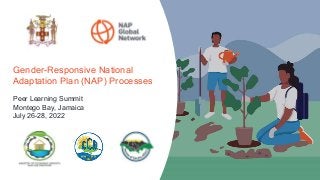
Introduction to the NAP Global Network and the Peer Learning Summit
- 1. Gender-Responsive National Adaptation Plan (NAP) Processes Peer Learning Summit Montego Bay, Jamaica July 26-28, 2022
- 2. Facilitation team Angie Dazé IISD/NAP Global Network EN, FR Tonni Brodber UN Women EN, FR Ayesha Constable GirlsCARE EN Aurélie Ceinos IISD/NAP Global Network EN, FR Catherine Senecal IISD/NAP Global Network EN, FR Kyana Bowen UN Women EN
- 3. Introduction to the NAP Global Network and the Peer Learning Summit Angie Dazé IISD/NAP Global Network
- 4. About the NAP Global Network Advance national adaptation planning and action in developing countries Support national- level action on NAP development and implementation Help countries learn from each other through South-South peer learning and exchange Generate, synthesize, and share knowledge on NAP processes OUR GOAL WHAT WE DO
- 5. Supporting national-level action on NAP development and implementation • Two mechanisms for technical support to countries: • Longer term in-country programs • Short-term technical support through the Country Support Hub • Support is demand-driven, with an emphasis on leveraging local expertise • Topics include tracking progress, Adaptation Communications, strategic communications, and gender-responsive NAP processes OUR REACH 58 developing countries have received direct technical support
- 6. South-South peer learning and exchange • Targeted events (like this one) and smaller exchanges • First peer learning event on gender in 2018 • Last two years have seen a bit of a pause • Developing a virtual peer learning strategy • View virtual peer learning as part of a bigger peer learning strategy OUR REACH Over 350 people from more than 50 countries have participated in peer learning and exchanges
- 7. Knowledge, analysis and communication • NAP Trends platform – track approaches, priorities • Key publications: • Climate and Disaster Risk Finance and Insurance • Vertical integration: Experiences from countries • Leveraging the NAP process for the GST • Biennial Gender Synthesis Report • Outreach events OUR REACH 250+ knowledge materials have been produced
- 8. Objectives of the Peer Learning Summit Participants will: • Better understand the linkages between climate change adaptation and gender equality, taking an intersectional approach. • Discuss the opportunities and challenges related to integrating gender considerations in NAP processes. • Identify concrete next steps they can take towards more gender-responsive NAP processes in their respective countries.
- 9. Overview agenda Getting to know each other Conceptual foundations Opening reception Overcoming challenges in gender mainstreaming Identifying entry points Outdoor activity Women’s leadership and intersectionality Master classes on gender tools Identifying next steps DAY 1 DAY 2 DAY 3
- 10. Thank you Email: info@napglobalnetwork.org Website: napglobalnetwork.org
